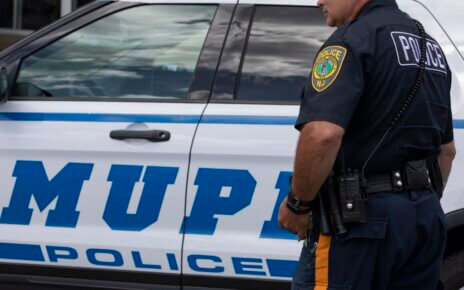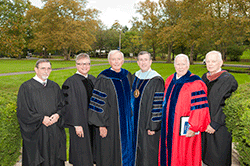The University heightened its police presence in response to a Philadelphia-area threat on Oct. 5. The FBI warned universities across the tri-state area after the threat was found on an anonymous message board.
The threat stated that a violent act would occur on a college campus near Philadelphia. According to nj.com it read, “On October 5, at 1 pm Central time, a fellow robot will take up arms at a university near Philadelphia.”
Colleges and Universities throughout the tri-state area were notified by the FBI’s Philadelphia office on Sunday of the threatening message. Although no specific college or university was targeted the threat came less than a week after nine individuals were killed at an Oregon community college.
On Monday Oct. 5, Patricia Swannack, Vice President for Administrative Services, released a press release notifying the community of security changes, “Members of the campus community, visitors to campus, and residents of our surrounding communities can expect an increase in police presence on and around campus that has been coordinated with our law enforcement partners in neighboring municipalities, as well as the Monmouth County Sheriff’s Office and the Monmouth County Prosecutor’s Office,” she said.
Police and security officials were stationed at different areas around the University. Monmouth University Police Department (MUPD) vehicles actively patrolled University grounds throughout the day, and a police dog was seen near the bookstore. The University received supplemental patrols from local police departments; however, MUPD is “…unable to disclose the number of outside agencies that were involved as it is law enforcement sensitive,” said Tara Peters, Associate Vice President of Marketing and Communications.
Mariel Herrera, a sophomore health studies major noticed the boost in police presence as she was walking to class on Monday. “I was walking past the MAC when I noticed a West Long Branch sheriff police car,” she said. “And later when I was heading back to my dorm I saw some officers congregated near Wilson. I didn’t think it was for our protection I just thought that there might be an event going on,” she said.
Some students did not notice any boost in security and police presence on campus. Toni Zangrilli, a junior chemistry major said, “I did not notice anything different on Monday. But it is definitely unsettling and comforting to know that we stepped up the security after being notified. Dangerous incidents can happen anywhere. I’m glad the University increased its safety measures even though there was an unlikely chance that we were the targets.”
Some colleges that received the warning included Rowan College, Stockton University, and Drexel University. All such universities increased their security and patrols throughout the day on Monday. Classes were canceled at various universities in and around Philadelphia.
According to President Brown, it is imperative that students are safe. “The safety and security of all members of our campus community, especially our students, is a top priority for me, and for everyone at Monmouth University,” said Brown. “We are very fortunate to have a well-trained police force, but the safety of our community also depends on each of us to look out for one another,” he continued.
John Comiskey, an assistant professor of homeland security, and a retired NYC Police Lieutenant, has advice on how students should or shouldn’t act in the event that they are ever under attack. “While most students will seek cover, some will panic. Move away from any potential violent situation as soon and as quick as responsible. Obey the instructions of uniformed law enforcement. The police will likely tell you to keep your hands up, don’t motion for your cellphone, and cooperate if the officers tell you that they will pat you down and/or search your bags.”
MUPD offers training for individuals interested in preparing for the possibility of an active shooter situation. In this training, participants are taught how to react based on their particular circumstance during the attack. Situations considered include: “if they [the student] are in the kill zone, confronted with the shooter, or in a non-kill zone, the shooter is near but it is not a confrontation, or whether to flee, hide or fight,” said Captain Dean Volpe, of MUPD.
Volpe suggests, “If in a non-kill zone, depending on how far away the shooter is, fleeing and/or hiding may be the best option. However, if confronted, a person must fight.”


